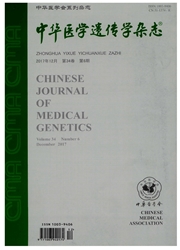

 中文摘要:
中文摘要:
目的探讨中国湖北地区人类白细胞抗原(human leukocyte antigen,HLA—DQA1)基因rs9272346单核苷酸多态性与慢性乙型肝炎不同转归的关联。方法采用病例一对照研究,招募湖北地区汉族35岁以上住院乙型重型肝炎(acute liver failure,ALF)173例、乙肝相关性肝硬化(1iver cirrhosis,LC)292例、乙肝相关性肝癌(hepatocellular carcinoma,HCC)325例、无症状乙肝携带者(asymptomatic HBV carrier,AHC)238例。应用TaqManMGB探针实时PCR技术检测rs9272346位点基因型,应用T检验、卡方检验和非条件Logistic回归进行统计分析。结果G等位基因型在ALF、LC、HCC组与AHC组分布差异无统计学意义(P=0.312、0.314、0.264)。在显性模型下,校正性别年龄因素后,GG+GA与AA基因型相比,与ALF(OR=1.08,95%CI:0.70~1.68)、LC(OR=1.11,95%CI:0.87~1.26)、HCC(OR=0.93,95%CI:0.65~1.33)患病风险无相关性。性别分层后显性模型下显示的女性患者中,GG+GA基因型与AA基因型相比为进展为重型肝炎的保护因素(OR=0.30,95%CI:0.1~0.87)。结论HLA—DQA1基因rs9272346位点单核苷酸多态性与乙型肝炎不同转归无相关性,女性患者中G等位基因携带可能是进展为重型肝炎的保护因素。
 英文摘要:
英文摘要:
Objective To assess the association of rs9272346 polymorphism of HLA-DQA1 gene with clinical outcome of hepatitis B virus (HBV) infection in ethnic Han population from Hubei, China. Method A case-control study was conducted, which have involved 1028 unrelated subjects including 238 asymptomatic HBV carriers (AHC), 173 acute liver failure (ALF), 292 liver cirrhosis (LC) and 325 hepatocellular carcinoma (HCC). Genotypes of rs9272346 were determined by real-time polymerase chain reaction with a TaqMan MGB probe. Statistical results were analyzed using Chi square test, student's t test and unconditional logistic regression. Results No significant differences were detected in the frequencies of G allele between ALF, LC, HCC and AHC groups (P=0. 312, 0. 314, 0. 264). Compared with the AA genotype, the GG and GA genotypes were not associated with the patients groups under the dominant model: ALF group vs. AHC group (adjusted OR= 1.08, 95%CI:0. 7-1.68), LC group vs. AHC group (adjustedOR=1. 11, 95%CI: 0.87-1.26), HCC group vs. AHC group (adjusted 0R=0.93, 95%CI: 0. 65-1. 33). For women, the GG and GA genotypes have conferred a protective effect for the outcome of ALF (OR=0.30, 95%CI: 0.1-1.87). Conclusion Our results suggested that rs9272346 polymorphism of HLA DQA1 may not independently influence the outcome of HBV infection in ethnic Han Chinese in Hubei, while the GG and GA genotypes may confer a protective effect against ALF in women.
 同期刊论文项目
同期刊论文项目
 同项目期刊论文
同项目期刊论文
 期刊信息
期刊信息
